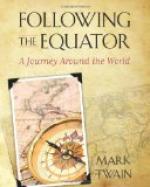Ballarat was a swarming city of tents in the early days. Everybody was happy, for a time, and apparently prosperous. Then came trouble. The government swooped down with a mining tax. And in its worst form, too; for it was not a tax upon what the miner had taken out, but upon what he was going to take out—if he could find it. It was a license-tax license to work his claim—and it had to be paid before he could begin digging.
Consider the situation. No business is so uncertain as surface-mining. Your claim may be good, and it may be worthless. It may make you well off in a month; and then again you may have to dig and slave for half a year, at heavy expense, only to find out at last that the gold is not there in cost-paying quantity, and that your time and your hard work have been thrown away. It might be wise policy to advance the miner a monthly sum to encourage him to develop the country’s riches; but to tax him monthly in advance instead—why, such a thing was never dreamed of in America. There, neither the claim itself nor its products, howsoever rich or poor, were taxed.
The Ballarat miners protested, petitioned, complained—it was of no use; the government held its ground, and went on collecting the tax. And not by pleasant methods, but by ways which must have been very galling to free people. The rumblings of a coming storm began to be audible.
By and by there was a result; and I think it may be called the finest thing in Australasian history. It was a revolution—small in size; but great politically; it was a strike for liberty, a struggle for a principle, a stand against injustice and oppression. It was the Barons and John, over again; it was Hampden and Ship-Money; it was Concord and Lexington; small beginnings, all of them, but all of them great in political results, all of them epoch-making. It is another instance of a victory won by a lost battle. It adds an honorable page to history; the people know it and are proud of it. They keep green the memory of the men who fell at the Eureka Stockade, and Peter Lalor has his monument.
The surface-soil of Ballarat was full of gold. This soil the miners ripped and tore and trenched and harried and disembowled, and made it yield up its immense treasure. Then they went down into the earth with deep shafts, seeking the gravelly beds of ancient rivers and brooks—and found them. They followed the courses of these streams, and gutted them, sending the gravel up in buckets to the upper world, and washing out of it its enormous deposits of gold. The next biggest of the two monster nuggets mentioned above came from an old river-channel 180 feet under ground.




